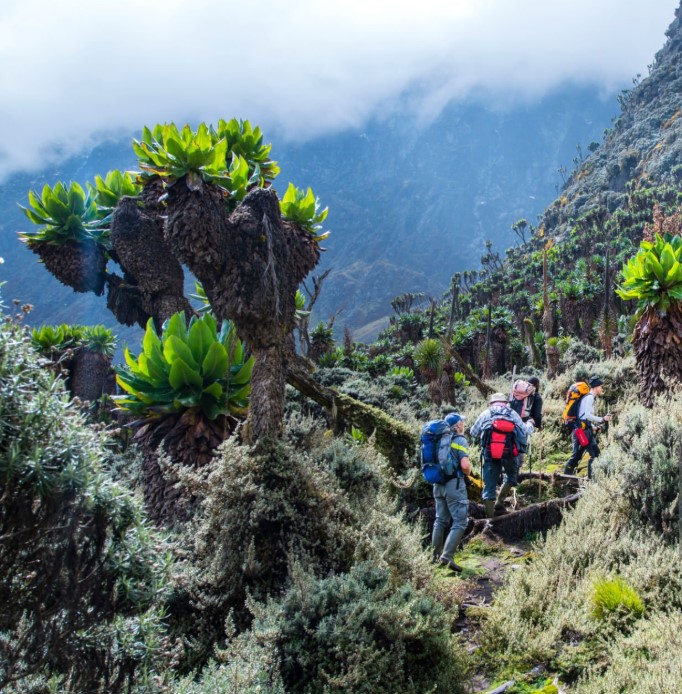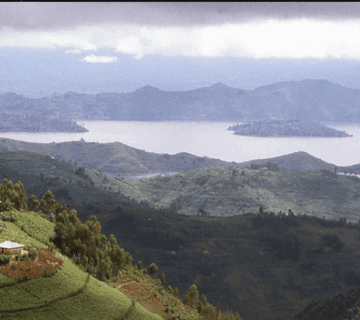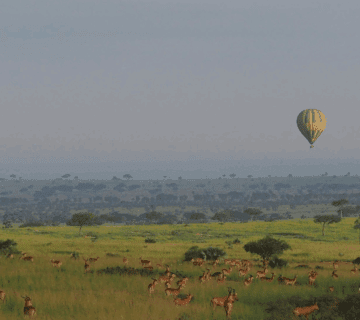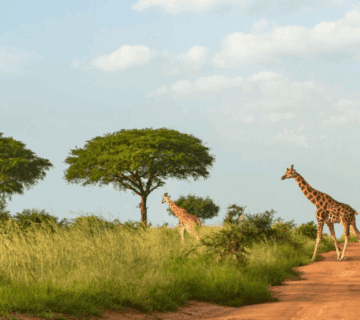How Long Does It Take to Climb Mount Elgon?
Mount Elgon, an extinct volcano located on the border between Uganda and Kenya, stands as one of East Africa’s hidden gems. With its towering peak, serene landscapes, and unique wildlife, it’s a trekking destination that offers an unforgettable adventure. Whether you’re an experienced mountaineer or a first-time climber, the question “How long does it take to climb Mount Elgon?” is essential in planning your journey. In this post, we’ll explore the trekking duration, factors that influence the time it takes, and some useful tips to ensure a memorable and safe climb.
Overview of Mount Elgon
Mount Elgon is a majestic volcanic mountain that rises to an impressive 4,321 meters (14,177 feet) above sea level. Known for its expansive caldera and diverse ecosystems, it offers hikers a variety of experiences. From lush forests to alpine meadows and breathtaking views, the mountain’s trails provide an ideal backdrop for nature lovers, wildlife enthusiasts, and those seeking to challenge themselves in the wild.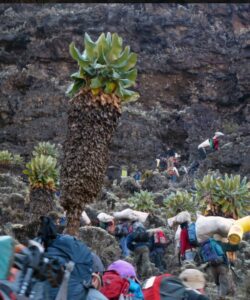
The climb to the summit of Mount Elgon is not a simple ascent. The trek is designed for adventurers who are physically prepared and ready to immerse themselves in the beauty of one of Africa’s lesser-known, yet equally captivating, peaks.
How Long Does It Take to Climb Mount Elgon?
The duration of your climb depends on the route you choose and your level of fitness, but in general, it takes anywhere from 4 to 7 days to complete a trek up Mount Elgon.
Here’s a breakdown of the most common trekking routes and how long they take:
1. Sasa Route (4-5 Days)
The Sasa Route is the most popular and shortest route to the summit. Starting from the Budadiri trailhead in Uganda, this route takes you through lush tropical forests, with a steady climb to higher altitudes. The Sasa Route is favored by trekkers because of its scenic beauty and relatively manageable pace. It’s an excellent choice for those with a limited amount of time but still wish to experience the mountain’s grandeur.
Day 1: Budadiri to Sasa River Camp (2,000m) – 5 hours
Day 2: Sasa River Camp to Mude Camp (3,500m) – 6-7 hours
Day 3: Mude Camp to Summit (4,321m) – 8-9 hours (summit day)
Day 4: Descend to Budadiri – 5-6 hours
The Sasa Route is typically completed in four days, with the option for an additional day at the summit for rest and acclimatization.
2. Piswa Route (5-6 Days)
The Piswa Route is slightly longer and offers a more gradual ascent, which can be beneficial for acclimatization. This route begins at the Piswa trailhead and weaves through diverse vegetation zones, offering climbers an opportunity to explore the mountain’s ecosystems.
Day 1: Piswa to Mude Camp (3,500m) – 6-7 hours
Day 2: Mude Camp to Wagagai Camp (4,200m) – 5 hours
Day 3: Wagagai Camp to Summit (4,321m) – 5-6 hours
Day 4: Summit to Wagagai Camp (descend) – 4-5 hours
Day 5: Descend to Piswa – 6-7 hours
This route is typically completed in five days, but it can take longer for those who need more time to adjust to the altitude.
3. Sipi Route (6-7 Days)
The Sipi Route is the longest and most scenic of all the routes on Mount Elgon. Starting from the Sipi Falls area in Uganda, this route takes you through beautiful valleys, forests, and caves, offering a rich trekking experience. Although longer, the Sipi Route is perfect for climbers who want to take their time, enjoy the surroundings, and enhance their chances of a successful summit.
Day 1: Sipi Falls to Sasa River Camp (2,800m) – 5-6 hours
Day 2: Sasa River Camp to Mude Camp (3,500m) – 6-7 hours
Day 3: Mude Camp to Wagagai Camp (4,200m) – 5 hours
Day 4: Wagagai Camp to Summit (4,321m) – 6 hours
Day 5: Summit to Wagagai Camp (descend) – 4-5 hours
Day 6: Descend to Mude Camp – 3-4 hours
Day 7: Mude Camp to Sipi – 5-6 hours
Factors That Influence Climbing Time
While the routes provide a general idea of how long it takes to climb Mount Elgon, there are several factors that may affect the duration of your trek. Let’s explore these in more detail:
1. Acclimatization
Altitude sickness can be a real concern when climbing Mount Elgon. It’s important to allow your body time to adjust to the decreasing oxygen levels at higher altitudes. Most trekkers follow a gradual ascent, but if you’re climbing too fast, it may extend the time it takes to summit. Climbers who take the necessary time to acclimatize will have a better chance of making it to the top without feeling unwell.
2. Weather Conditions
The weather on Mount Elgon can change rapidly, and unpredictable rainfall, fog, or storms can delay the progress of your trek. It’s always advisable to check the weather forecast before starting your climb, although conditions can still change unexpectedly at higher altitudes.
3. Fitness Level
Your fitness and stamina play a major role in determining how quickly you’ll reach the summit. Climbers with good physical conditioning will move faster and recover better from the physical exertion of the trek. However, if you’re new to hiking or don’t regularly engage in endurance exercises, you might need to take things slower, which could extend your trek duration.
4. Trekking Pace
The pace you set during the trek is another critical factor. Some climbers prefer to take their time and enjoy the journey, while others might push themselves to reach the summit faster. However, pushing too hard can be dangerous, particularly at high altitudes, so it’s always a good idea to take regular breaks and stay hydrated.
5. Group Size
If you’re trekking as part of a group, the pace of the group will generally dictate how long the trek takes. Larger groups or groups with less experience may move slower. It’s essential to stay patient and focus on the journey rather than just the destination.
Tips for Climbing Mount Elgon
Plan for Acclimatization: Ensure you allow time for acclimatization to avoid altitude sickness.
Pack Light but Wisely: Pack light to make your trek easier but ensure you have all essential gear, including sturdy footwear, rain gear, and warm clothing.
Hire a Guide: While the trails are marked, hiring a knowledgeable guide will enhance your safety and experience.
Stay Hydrated and Nourished: Keep plenty of water and high-energy snacks available to maintain energy levels throughout the trek.
Respect the Environment: Mount Elgon’s ecosystems are delicate. Follow Leave No Trace principles and respect the environment during your climb.
Conclusion
The time it takes to climb Mount Elgon depends on the route you take, your physical condition, and how well you acclimatize to the altitude. Whether you take the shorter Sasa Route in four days or the more leisurely Sipi Route in seven, the climb will undoubtedly offer you an unforgettable experience surrounded by nature’s finest beauty. Remember that the journey to the summit is as much about the experience as it is about the destination, so take your time to appreciate every step of the way.
If you’re ready to challenge yourself and enjoy the adventure of a lifetime, Mount Elgon awaits. Be sure to plan accordingly, listen to your body, and most importantly, embrace the incredible landscapes that will leave you inspired long after the climb.

